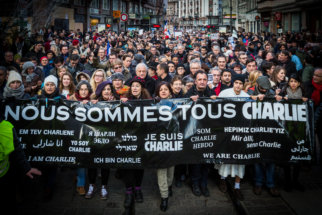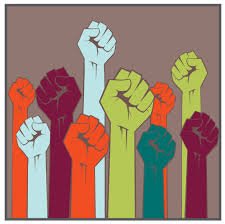In 2016, I wrote my first critique as an editor at HonestReporting. Titled, Is Murdering Israelis Just “Human Nature”? , it deconstructed a statement by then-UN secretary general Ban Ki-moon:
Stabbings, vehicle attacks, and shootings by Palestinians targeting Israeli civilians have continued to claim lives . . . Yet, as oppressed peoples have demonstrated throughout the ages, it is human nature to react to occupation, which often serves as a potent incubator of hate and extremism.
(Emphasis added)
Ban followed up his statement with a New York Times op-ed, in which he made a similar claim. In my article, I examined occupations over time and revealed that it is objectively not human nature to react as Ban suggested, and, further, that Ban did not make any such claims against any of the other 189 countries engaged in territorial disputes at that time.
He targeted only Israel.
Enter Charlie Hebdo
On January 7, 2015, Islamic fundamentalists stormed the Paris offices of a satirical magazine, Charlie Hebdo, and opened fire, killing 12 and injuring 11 others. The reason? Because the magazine had published cartoons depicting the Prophet Mohammad. To be clear, the complaint from much of the Muslim world was not necessarily that Mohammad had been depicted in a particularly offensive manner, but that his image had been reproduced at all: as any visual rendition of Mohammad is prohibited by Islamic law.
For the most part, the world — and the media — showed an outpouring of sympathy and support for France, in stark contrast to coverage we so often see when terrorism is directed at Israelis.

Protest against Charlie Hebdo shooting, Strasbourg, France.
But in 2020 France no longer basks in the warmth of global sympathy. Instead, the New York Times led with the headline: “French Police Fatally Shoot and Kill Man after a Fatal Knife Attack on the Street,” terminology disturbingly familiar to people, like HonestReporting’s staff, who closely followed international coverage of the “Stabbing Intifada” against Israelis. The NYT headline was later updated to include wording somewhat less ghastly, but much of the global media continued to blame Paris, rather than the attacker, based on the theory that attacks of this sort are a kind of natural response to racism.
Marcon speaks up
This week, President Emmanuel Macron of France spoke up publicly, echoing some of the same frustration and personal pain we so often hear from Israelis and their supporters. In a New York Times article, The President vs. the American Media, the French president was quoted as saying:
When France was attacked five years ago, every nation in the world supported us…so when I see, in that context, several newspapers which I believe are from countries that share our values — journalists who write in a country that is the heir to the Enlightenment and the French Revolution — when I see them legitimizing this violence, and saying that the heart of the problem is that France is racist and Islamophobic, then I say the founding principles have been lost.
In so many ways, Israel has long been a “canary in the coal mine,” suffering new forms of attacks that later spread to the rest of the free world: airplane hijackings in the 1970s; suicide bombings in the 1980s; and the ongoing weaponization of automobiles and kitchen knives. And now, the latest form of attack — one that has shocked France but is old news to Israelis — is the media’s insistence on blaming the victim.
Why did this happen? The new academia
Why in the world would Western media blame Western countries for being victims of attacks? This is at least partially attributable to the popularization of a new academic philosophy that has taken hold in the field of journalism called “postcolonial theory.” In short, the theory states that all, or nearly all, aspects of modern Western culture can be understood only through the lens of European imperialism of the 18th and 19th centuries and the resulting oppression of, well, anyone who isn’t European. (For the purposes of this theory, the United States and Israel are typically lumped together with European empires even though during the relevant era America was not yet a global power and Israel did not exist at all).
This ties in with critical race theory, the idea that the law and associated institutions are inherently racist and that race itself, instead of being biologically grounded, is a social construct used by white people to further their economic and political interests at the expense of, well, everyone who isn’t “white.” (Jews and Israelis, regardless of their ancestry or complexion, are typically defined as “white.”)

Finally, it all ties together with a theory called “intersectionality,” which posits that all relationships can be understood through the lens of an “oppressor-oppressed” dynamic, and that all “marginalized people” are effectively the same. So, for example, a supporter of Black Lives Matter (BLM) who promotes “intersectionality” might conclude that Palestinians are the “same” as African-Americans, and therefore support for racial equality in America sometimes may require opposition to Israel.
This is why, for example, the official Black Lives Matter movement in America has adopted a platform that includes an anti-Israel component. This does not reflect the view of all Americans who support the cause, but it is the movement’s official position according to its website. It is also the reason why BLM-related resolutions adopted this fall by the student bodies at Columbia University and the University of Illinois contained anti-Israel language.
Most of these academic theories have existed in one form or another for several decades but, in recent years, they have become increasingly influential in mainstream media — providing journalists with a basic construct in which to explain complex issues without requiring much research or independent thinking. Thus, a terror attack on Israelis is considered “human nature,” and a religiously-motivated beheading in France is explained as the natural result of Islamophobia.
That Israel and the Jewish people are no longer alone in facing a new form of attack is of little comfort. That this new method has taken root in the international press makes it all the more insidious, because it lends support for acts of violence and makes terrorism more difficult to combat.
At HonestReporting, we take our responsibility more seriously than ever: to not only defend Israel from media bias, but to defend truth and fairness throughout the free world.
Learned something new here? Please take a moment to share this article on social media and follow the Israel In Focus page on Facebook to read more articles explaining Israel’s history, politics, and international affairs. Click here to learn more!
Featured image: Via Shutterstock
Source material can be found at this site.









